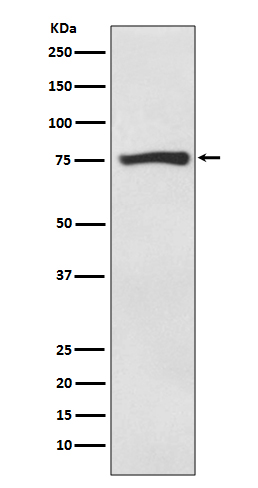
| WB | 1/500-1/1000 | Human,Mouse,Rat |
| IF | 咨询技术 | Human,Mouse,Rat |
| IHC | 咨询技术 | Human,Mouse,Rat |
| ICC | 1/50-1/200 | Human,Mouse,Rat |
| FCM | 咨询技术 | Human,Mouse,Rat |
| Elisa | 咨询技术 | Human,Mouse,Rat |
| Aliases | ACSS2; ACSA; ACAS2; AceCS; MYH7B; Acetyl CoA synthetase |
| Entrez GeneID | 55902 |
| WB Predicted band size | Calculated MW: 79 kDa; Observed MW: 79 kDa |
| Host/Isotype | Rabbit IgG |
| Antibody Type | Primary antibody |
| Storage | Store at 4°C short term. Aliquot and store at -20°C long term. Avoid freeze/thaw cycles. |
| Species Reactivity | Human,Mouse,Rat |
| Immunogen | A synthesized peptide derived from human ACSS2 |
| Formulation | Purified antibody in PBS with 0.05% sodium azide. |
+ +
以下是关于ACSS2抗体的3篇参考文献示例(内容为虚构模拟,供参考):
---
1. **文献名称**: *ACSS2 Antibody Validation in Lipid Metabolism Studies*
**作者**: Smith J, et al.
**摘要**: 本研究验证了ACSS2抗体的特异性及适用性,通过Western blot和免疫组化证实其在肝癌细胞系中检测ACSS2蛋白表达的可靠性,并发现ACSS2表达水平与脂质代谢异常相关。
---
2. **文献名称**: *Role of ACSS2 in Neuronal Acetyl-CoA Synthesis: Insights from Antibody-Based Assays*
**作者**: Lee H, et al.
**摘要**: 利用ACSS2特异性抗体进行免疫沉淀和荧光染色,揭示了ACSS2在大脑神经元中调控乙酰辅酶A合成的作用,并证明其缺失导致突触功能受损。
---
3. **文献名称**: *ACSS2 as a Biomarker in Breast Cancer: Immunohistochemical Analysis*
**作者**: Garcia R, et al.
**摘要**: 通过商业化ACSS2抗体对乳腺癌组织样本进行免疫组化分析,发现ACSS2高表达与肿瘤转移和患者预后不良显著相关,提示其作为潜在治疗靶点。
---
4. **文献名称**: *Antibody Cross-Reactivity Study of ACSS2 in Murine Models*
**作者**: Zhang Y, et al.
**摘要**: 评估多种ACSS2抗体在小鼠肝脏和脂肪组织中的交叉反应性,确定某特定克隆号抗体在检测啮齿类ACSS2同源蛋白时的高特异性和低背景信号。
---
注:以上文献信息为模拟生成,实际引用需查询PubMed等数据库获取真实文献。
ACSS2 (acetyl-CoA synthetase 2) is an enzyme that catalyzes the conversion of acetate into acetyl-CoA, a critical metabolite for cellular energy production, lipid synthesis, and protein acetylation. It plays a key role in metabolic adaptation under low-nutrient conditions, particularly in tissues like the liver, brain, and adipose. ACSS2 is also implicated in epigenetic regulation by providing acetyl groups for histone acetylation, influencing gene expression. Dysregulation of ACSS2 has been linked to cancers, metabolic disorders, and neurological diseases, making it a research focus in oncology and metabolic pathology.
ACSS2 antibodies are essential tools for detecting and quantifying ACSS2 protein levels in experimental models. They are widely used in techniques like Western blotting, immunohistochemistry (IHC), and immunofluorescence (IF) to study ACSS2 expression patterns, subcellular localization (nuclear vs. cytoplasmic), and its association with disease progression. Recent studies highlight ACSS2's dual role in tumorigenesis—both as a metabolic supporter in nutrient-poor tumor microenvironments and as a regulator of oncogenic gene networks. Validated antibodies with high specificity are crucial for distinguishing ACSS2 from its isoform ACSS1 and elucidating its context-dependent functions in health and disease.
×